Executive Summary:
The rate of Turkish military attacks on areas in North and Northeast Syria escalated during the second half of 2022 and has climaxed since November 20. Turkish planes bombarded residential areas, several critical facilities, and oil and energy sources, causing the death of 11 civilians, including a journalist, and wounding others.
The recent Turkish attacks coincided the declaration of the operation “Claw-Sword” against Northern Syria and Northern Iraq on November 20 by the Turkish Army, which alleged the operation was a retaliation to the explosion that took place in “Istiklal Street” in Istanbul on November 13, 2022, in which six people were killed and more than 80 others were injured. Ankara accused the Syrian Democratic Forces (SDF) of being behind the blast. In turn, the SDF denied any involvement and no party has claimed responsibility for the blast that was carried out in the pedestrian Street in Ankara, the Turkish capital.
The Turkish operation was limited to airstrikes with dozens of drones and warplanes. This operation is the biggest one since “Peace Spring” Operation that was launched in October 2019, which during which Turkey occupied the areas between Ras al-Ayn/Serê Kaniyê and Tall Abyad in Northeast Syria.
The Turkish airstrike targeted civilian objects[1], including a school and a hospital quipped to offer medical services to children which was formerly used as COVID-19 care facility in Ayn al-Arab/Kobanî located in Aleppo countryside, a grain silos in Ad-Darbasiyah countryside located in al-Hasakah governorate and a power plant in the countryside of al-Malikiyah/Derik.
Turkey carried out airstrikes in a row on at least two sites; the kids’ hospital in Kobanî and the power plant in al-Malikiyah/Derik. After shelling both sites for the first time, Turkish planes hit the two sites again after medical teams, civilians and journalists gathered in the scene.
The two attacks killed 11 civilians, among them a journalist who was reporting in the countryside of al-Malikiyah/Derik while others were injured. The Committee to Protect Journalists (CPJ) said the same area where the journalist was reporting from had been the target of a separate airstrike in the same location just hours earlier.
Targeting the primary school and the kids’ hospital in Kobanî coincided the World Children’s Day that marks November 20 each year and calls for the children’s protection, health, and peace worldwide and devotes itself to defend, promote and celebrate the children’s rights and render them to discussions and actions to build a better place for the children.
The next day, on November 21, 2022, the Turkish Ministry of National Defense declared the completion of its swift operation in Northern Syria and Northern Iraq. Hulusi Akar, the Turkish Minister of Defense said Turkish planes carried out 89 airstrikes. However, speaking to reporters on his return flight from Qatar after attending the opening ceremony of FIFA World Cup 2022, the Turkish president Recep Tayyip Erdoğan told the press that Operation “Claw-Sword” in north Syria and north Iraq won’t be limited to the airstrikes, indicating that his country will decide the bulk of the ground forces that will take part in the operation.
Turkish attacks subsequently expanded to reach the rural parts of al-Hasakah and Deir ez-Zor and even hit the al-Hol Camp, taking more hostile grants. Turkish planes pounded several critical facilities and power, gas and oil sources rendering them inoperable and denying hundreds of thousands of people from energy. Millions of others were affected across Syria at the time when the region already suffer dilapidated infrastructure by the conflict, which has been ongoing since 2011.
The advance in the scale of Turkish aggressions on areas in Northeastern Syria indicates Turkey’s intention to destroy the region’s economy and deprive the residents from their basic rights and services.
The damage inflicted on the energy infrastructure has disastrously affected the civilians’ lives in Northeastern Syria which has become a resort for hundreds of thousands of Internally Displaced Persons (IDPs) and has exacerbated the already existing humanitarian crisis. The attack on the power plant near al-Malikiyah/Derik has caused significant power cuts in many regions in al-Hasakah governorate. The same power plant feeds electricity to Allouk water station, the only source for water in Northern Syria that serves approximately 800,000 people in the region, notably in al-Hasakah city and Tell Tamer town and their countryside. Water is trucked from Allouk station for the camps of al-Hol, al-Areesha, Washokani/al-Twinah, according to the International Committee of the Red Cross (ICRC).
Targeting gas and oil facilities caused acute fuel shortage which has been an existing crisis in Northeastern Syria and has left civilians struggling to find cooking and heating fuel for winter.
Turkish operations have already led to displacement. It is likely that the attack, in case it continues, and Turkey starts a ground military operation, will cause the displacement of more hundreds of thousands of people and this will over-stretch humanitarian response efforts that have already been exhausted by previous incursions.
In a report issued on December 7, 2022, Human Rights Watch (HRW) stated “the Turkish airstrikes since November 20, 2022, are inflicting damage on densely populated areas and critical infrastructure in North and Northeast Syria and exacerbating an already catastrophic humanitarian crisis for Kurds, Arabs and other communities in the region.”
Hevdesti-Synergy joined 199 Syrian organizations and issued a statement on November 29, 2022 that strictly condemned the threats and continuous hostilities in Northern Syria, calling on the UN Security Council to immediately intervene to stop the hostilities and take firm procedures to prevent the instability or any new military operations in Northern Syria, notably that previous military operations have caused the displacement of tens of thousands of the indigenous people and documented myriad of human rights violations by international organizations and UN independent bodies on Syria.
Legal Liability:
In its airstrikes on areas in North and Northeast Syria, Turkey did not regard the protection of civilians’ lives, knowing that Turkish aerial bombardment started mere days after Turkey and 81 other countries adopted a political declaration seeking to improve the protection of civilians worldwide from the use of explosive weapons in populated areas.
Turkish government continued to bomb populated areas contradicting the Fundamental Principles of Human Rights and violating laws of armed conflicts. The laws of war strictly prohibit attacks targeting civilians or civilian structures unless they were being used for military purposes and prohibit indiscriminate attacks that fail to distinguish between military and civilian targets.
Under international law, Turkish Armed Forces must take all feasible measures to avoid, and in any event, minimize the loss of civilian life, injuries to civilians, and damage to civilian objects during military operations. This means they should strictly observe international standards and procedures with respect to their means and methods of warfare designed to prevent civilian casualties and should robustly and transparently report airstrikes and enemy and civilian casualties.
In all cases, the Turkish authorities should promptly, impartially, and thoroughly investigate any civilian casualties resulting from its operations. They should identify those responsible for civilian deaths resulting from violations of international humanitarian law and hold them accountable and provide compensation for wrongful civilian deaths and injuries and appropriate ex gratia payments for civilian harm.
US Warning:
On November 18, 2022, the U.S. Consulate General Erbil in Kurdistan Region of Iraq advised US citizens to avoid travelling to areas in Northern Syria and Northern Iraq as the US is monitoring credible open-source reports of potential Turkish military action.
The American alert came days following the explosion that took place in “Istiklal street” in the middle of Istanbul on November 13, 2022, in which six persons were killed and 81 were injured.
Immediately after the explosion, the Istanbul General Security Directorate announced it arrested the person who implemented the explosion and claimed it was a woman, named “Ahlam al-Bashir”, who was trained by the SDF and the People’s Protection Units (YPG) in Northeast Syria.
The SDF denied the charges and said the Turkish version was “misleading” and said in a statement that “it denies any involvement in the blast in Istanbul.”
On November 15, 2022, the Democratic Union Party (PYD), the heart of the Autonomous Administration of North and East Syria (AANES), issued a statement saying “Turkey is preparing the ground for launching new attacks on our regions by accusing our forces and areas of being behind Istanbul explosion,’’ stated by co-chair of the PYD Salih Muslim. He also added, “Turkey planned the explosion scenario, and it will launch an attack when it has the opportunity.”
Turkish Threat:
The SDF denied the Turkish accusations, yet Turkey did not hesitate to launch airstrikes on many areas in North and Northeast Syria leaving civilian casualties and exacerbating the current catastrophic humanitarian crisis.
Following the Turkish raids, the SDF vowed in a statement to respond to the Turkish bombardment in the convenient time and place saying, “Turkish attacks will not remain unanswered. We will respond in the convenient time and place and our response will be strong and effective.”
Since May 2022, Erdoğan has been threatening a new military incursion into Northeast Syria. This planned incursion would be Turkey’s fourth one into Northern Syria since 2016. Turkish drone attacks and bombardment by Turkish forces and Turkish-backed Syrian forces have escalated on cities and towns in Northeast Syria killing and injuring civilians, including children.
All Turkish military operations in Syria since 2016 were fraught with violations and were accompanied with threats and repeated hostilities in villages, towns and cities in the north of Syria and have caused relative instability in the region that became a haven for hundreds of thousands of IDPs from different stricken Syrian areas.
Turkish Aggressions Exacerbates Humanitarian Crisis:
Turkish airstrikes inflicted damage to many residential areas, service structures and critical facilities in North and Northeast Syria in a time when the region’s economy is in free fall and has got an already decimated infrastructure.
On November 20, 2022, Turkish planes carried out at least eight airstrikes on Kobanî/Ayn al-Arab city, targeting different positions including Mashtanour hill and Kobanî forest (Daristana Kobanî in Kurdish) destroying a school and a hospital quipped to offer medical services to children which was formerly used as COVID-19 care facility.
The journalist, Muhammed Jaradah, Stêrk TV reporter, was wounded while covering, along with other journalists the impact of the bombardment on Mashtanour hill in Kobanî. The same site was pounded twice consecutively/successively. After Turkish planes struck the site once, medical teams, journalists and others headed to the scene and Turkish planes struck the site for the second time causing head injuries to Jaradah whose work colleagues transferred him to a hospital. Sterk TV published a video footage of the airstrike on the hospital and transferred its reporter to another hospital.
Jihad Nebu, a journalist who works for a Kurdish regional media outlet, detailed to Hevdesti-Synergy the Turkish attacks on Kobanî city as he was close to the scene. He said:
“In the early hours of November 20, 2022, Turkish airstrikes hit several sites in Kobanî, including “Mashtanour” hill which was pounded with four consecutive missiles that left significant material damage in a civilian populated area, although no military positions exist there.”
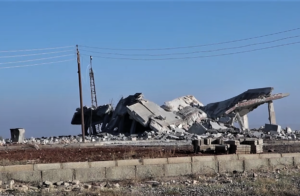
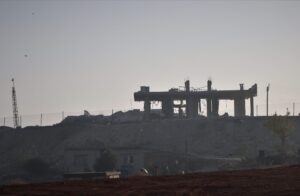
Image (1) and (2) showing the destruction inflicted to the hospital equipped for children in Kobanî due to the Turkish airstrike on November 20, 2022. Photo credit: Hawar News Agency.
Turkish bombardment also targeted and completely destroyed the primary school of “Koran” village in the east countryside of Kobanî, spreading fear and panic among the students and villagers. The Turkish attacks deprived thousands of children from pursuing their education due to suspending school attendance in 19 primary schools in the countryside of Kobanî, which lies in the contact lines with areas under the control of Turkey and Turkish-backed opposition factions of the Syrian National Army (SNA). Kobanî is frequently targeted by Turkey and its allies.
A witness from “Koran” village expressed to Hevdesti-Synergy his intentions to migrate along with his family due to insecurity following the continuous Turkish attacks and threats on areas in North and Northeast Syria, especially on Kobanî, Manbij and Tall Rifat in northern Aleppo. He said:
“My only son, who is in the third grade was deprived of his education because Turkey struck his school and therefore attendance was suspended in many schools in Kobanî. It is hard for me to convince him to stay indoors. He cries everyday asking to go back to his demolished school, and I therefore decided to migrate abroad with my family. We are not safe here as long as our neighbor Turkey speculates our children’s schools as a threat to its security.”
Targeting the primary school and the kids’ hospital in Kobanî coincided the World Children’s Day that marks 20 November each year and calls for the children’s protection, health, and peace worldwide and devotes itself to defend, promote and celebrate the children’s rights and render them to discussions and actions to build a better place for the children.
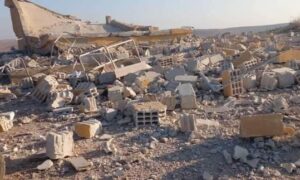
Image (3) showing the destruction inflicted to “Koran” primary school in the countryside of Kobanî due to Turkish airstrikes on November 20, 2022. Photo credit: the Board of Education- the Euphrates Region.
Another source/witness from Kobanî[2] told Hevdesti-Synergy that several sites located between Tall Abyad and Kobanî were hit by Turkish airstrike, killing one and injuring another solider from the Syrian government forces responsible for protecting the Syrian-Turkish border.
In the countryside of ad-Darbasiyah city, Turkish airstrikes targeted the grain silos in Dahir al-Arab village, causing significant damage and targeting another populated area in Abu Rasin/Zargan town, eastern Ras al-Ayn/Serê Kaniyê, as well as military points affiliated with the Syrian government forces.
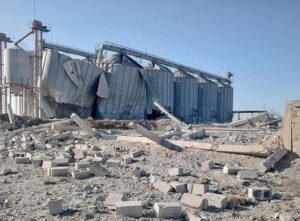
Image (4) showing impact of the Turkish bombardment on November 20, 2022, that targeted the grain silos in Dahir al-Arab village in ad-Darbasiyah countryside. Photo credit: Baz News Agency.
On November 21, 2022, Hevdesti-Synergy interviewed a witness from Abu Rasin/Zargan[3] who said that the Turkish airstrike killed three soldiers of the Syrian government forces in the northern village of Tall Harmal in the north countryside of Abu Rasin.
The Syrian national official SANA News Agency said that several Syrian government soldiers were killed in the Turkish airstrikes on the Syrian soil in the countryside of Aleppo and al-Hasakah in the early hours of November 20, 2022.
Turkish attacks were more hostile in the region lying between Qamishli-Qamishlo and al-Malikiyah/Derik where Turkish planes targeted populated areas and critical infrastructure, including the power station and some oil and gas fields. This progress in the scale of Turkish aggressions on areas in Northeast Syria indicates Turkey’s intention to destroy the region’s economy and deprive its residents from their basic rights and services.
The power station in Taql Baql village was also targeted with two consecutive attacks. One worker was killed in the power station and others were injured in the first raid and when civilians, who live nearby, reached the scene and started to rescue the and ambulance the wounded, Turkish planes struck the scene for the second time killing 10 civilians, including medics and a journalist. The power station got out of service and power was cut off in more than 60 villages in al-Malikiyah/Derik countryside.
The body of the journalist Essam Abdullah, Hawar News Agency’s reporter, was found burned along with his camera in the same site where it was targeted twice. A survivor whom Hevdesti-Synergy interviewed said the victim was filming the impact of the first raid while the survivor along with others were attempting to rescue the wounded people. The CPJ[4] called on Turkish authorities to immediately conduct a full and transparent investigation into whether Hawar News Agency (ANHA) reporter Essam Abdullah and other civilians were targeted during Turkish airstrikes in Northern Syria. Sherif Mansour, CPJ Middle East and North Africa Program Coordinator said, “journalists are civilians and should be protected while doing their jobs.”
Hevdesti-Synergy talked to Saed Ali, 36, who is a survivor of the consecutive airstrikes that targeted the power plant in Taql Baql village in al-Malikiyah/Derik countryside.
Ali was wounded in the second raid while he was checking victims of the first raid. He described the scene saying:
“As soon as the power station was hit, some villagers and I rushed to the scene to save the workers. But while we were rescuing the wounded people, another attack took place, and I was injured in different parts of my body. I was transferred to the national hospital in Derik city.”
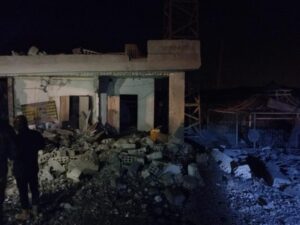
Image (5) showing signs of the destruction in the power plant in Taql Baql village in al-Malikiyah/Derik countryside after Turkish drones struck it with two consecutive attacks on November 20, 2022. Photo credit: Hawar News Agency.
Abu Rasin/Zargan town and its villages, eastern Serê Kaniyê, were subject to Turkish airstrikes and continuous artillery and missile bombardment by Turkey and Turkish-backed factions of the SNA.
Hevdesti-Synergy interviewed a witness whose house was partially damaged and whose mother was injured in the Turkish attack during November 2022. She said:
“A barrage of missiles hit our house. One of them hit the house directly and the other dropped in the house’s vicinity. There was huge material damage, and my elderly mother was injured in several parts of her body.”
According to the witness, the intensity of the Turkish bombardment on Abu Rasin/Zargan prevented medical teams from the urgent intervention to rescue the wounded. She added:
“The strikes also hit my brother’s house which is located near ours, in addition to targeting the whole neighborhood. None could help us due to the intensity of the bombardment. We were forced to protect ourselves and wait until the shelling stopped, then we transferred our mother to the ad-Darbasiyah-based clinic for treatment.”
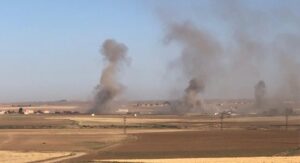
Image (6) showing the indiscriminate bombardment on villages in the countryside of Abu Rasin/Zargan town. Photo credit: Local Facebook accounts.
A resident from ‘’Bobi’’ village, in the North countryside of Abu Rasin/Zargan town, told Hevdesti-Synergy:
“Our village and the nearby villages like Dada Abdal, Miharmlah, al-Matmourah have been frequently subjected to artillery bombardment for three years, but the scale of the strikes has increased recently and staying here is dangerous.’’
According to the witness, dozens of villagers and residents of the other villages displaced to the camps of Washokani/al-Twinah and Serê Kaniyê/al-Talaee’ in al-Hasakah countryside as a result of the frequent Turkish attacks on their villages and farms.
———————
[1] Objects that are not used for military purposes, such as residential areas.
[2] The interview was conducted virtually on November 25, 2022. The witness’s information is withheld upon his request.
[3] The witness’s information is withheld upon his request.
[4] The Committee to Protect Journalists (CPJ) is an independent non-profit organization based in New York city. CPJ promotes press freedom in the world.

